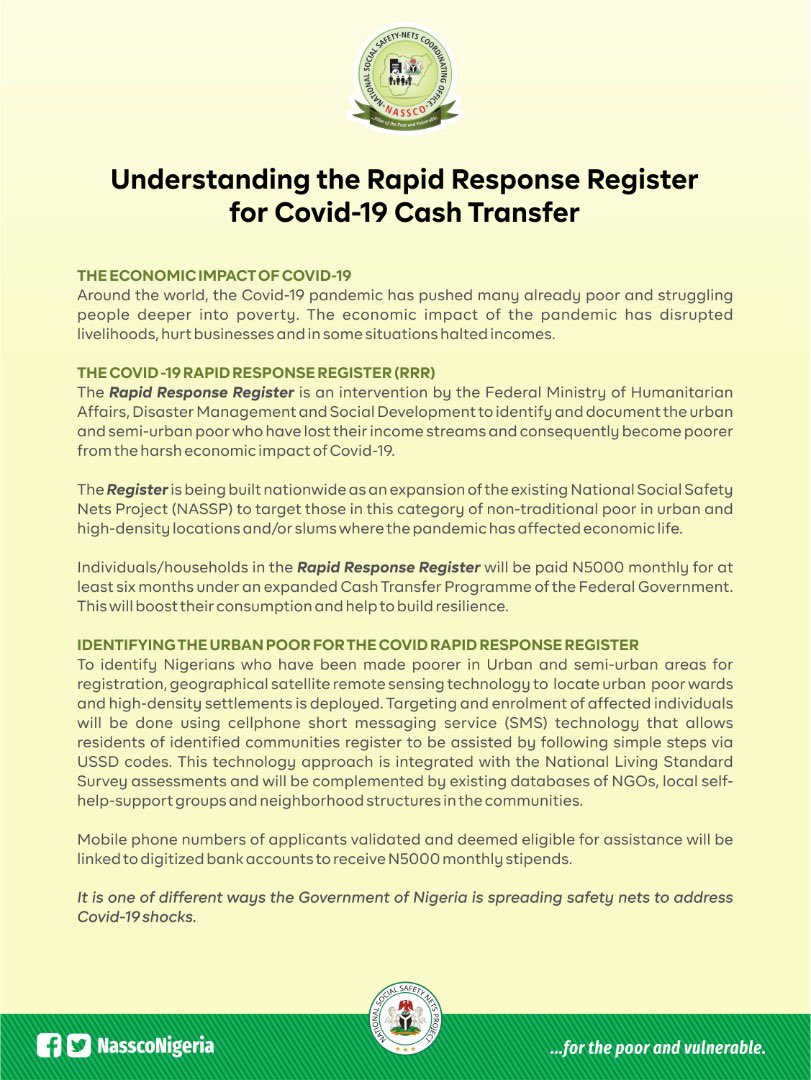Nigeria
Nigeria hosts the highest number of extremely poor in the world, with over 86.5 million people or 42% of the country population living on less than US$1.90 a day in 2020. Addressing poverty and vulnerabilities in times of crisis such as the current COVID-19 pandemic requires a system that can cover all Nigerian residents if needed, and rely on speedy targeting options, identification and delivery procedures to be extended rapidly.
Strengthening and Expanding the National Social Registry (NSR) as a shock-responsive social protection system in Nigeria is a one-year technical cooperation project between the ILO and the National Social Safety Nets Coordination Office (NASSCO) under the Federal Ministry of Humanitarian Affairs, Disaster Management and Social Development (FMHDS). The initiative aims to increase access to social assistance for Nigerian extremely poor and vulnerable individuals, in particular those affected heavily by the COVID-19 crisis.
Amidst the COVID-19 crisis, there has been a growing realization that the NSR – intended to guide all social assistance and humanitarian efforts in the country – has not been able to reach its full potential yet as a shock-responsive system with national-wide coverage. Limited coverage, a restrictive identification method and a lack of linkages with the humanitarian and health sectors are among its main challenges.
Against this backdrop, the project supported activities to strengthen the NSR system with mechanisms for interoperability with humanitarian relief and health insurance at the national and subnational level of Adamawa and Yobe states. This was complemented with capacity-building activities with staff of Federal Ministry of Humanitarian Affairs, Disaster Management and Social Development on shock-sensitive, gender-sensitive and disability-inclusive social protection systems and programmes. All these were done to ensure achievement of the project outcomes:
1) National Social Registry (NSR) is strengthened as an effective management information system for social protection in Nigeria, with improved mechanisms for interoperability with humanitarian relief as well as rapid relief to vulnerable groups impacted by shocks, including economic shocks;
2) Capacity building programme put in place of the FMHDS, NASSCO and partners to implement and monitor effectively shock-sensitive gender-sensitive and disability-inclusive social protection systems and programmes, including COVID-19 response measures for all residents of Nigeria.
Key results achieved in 2020-22
- The Unified Registry of Beneficiaries (URB) and Rapid Respond Registry (RRR) were established and exists as a sub-set of the National Social Registry (NSR).
- Development of process flow for defining linkages between the Unified Registry of Beneficiaries (URB) and Rapid Respond Registry (RRR) database as a sub-set of the NSR has been developed by the NASSCO team.
- Drafting of step-by-step protocol for the harmonization of other database from partners in the humanitarian and social protection space.
- Project states (Adamawa and Yobe) have existing memoranda of understanding signed with the State Health Insurance, and State Health Insurance Agencies (SHIA) are mining beneficiaries from the State Social Registry.
- The implementation guideline for the Rapid Response Register (RRR) has been developed and finalised.
Events
- Project launch “Towards expanding and utilizing the National Social Register as part of Nigeria’s shock response and social protection infrastructure” (November 2020): Twitter post; Press realease
- Training activity on shock-sensitive, gender and disability-inclusive social protection programs (October 2021). Article: Independent
Contacts
Dramane Batchabi, Social Protection Specialist West Africa, ILO, Batchabi@ilo.org
Emmanuel Danjuma, Project Officer, ILO, Danjuma@ilo.org
Training on shock-responsive, gender-sensitive and disability-inclusive social protection for staff of Federal Ministry of Humanitarian Affairs, Disaster Management and Social Development
“The COVID-19 pandemic has brought with it an unprecedented human development crisis and it is essential to unite efforts to tackle poverty and inequality. I am proud of this joint effort with ILO and NASSCO as Nigeria has a strong social protection system and this collaboration will strengthen it so it can respond quicker and more efficiently to crises.”


